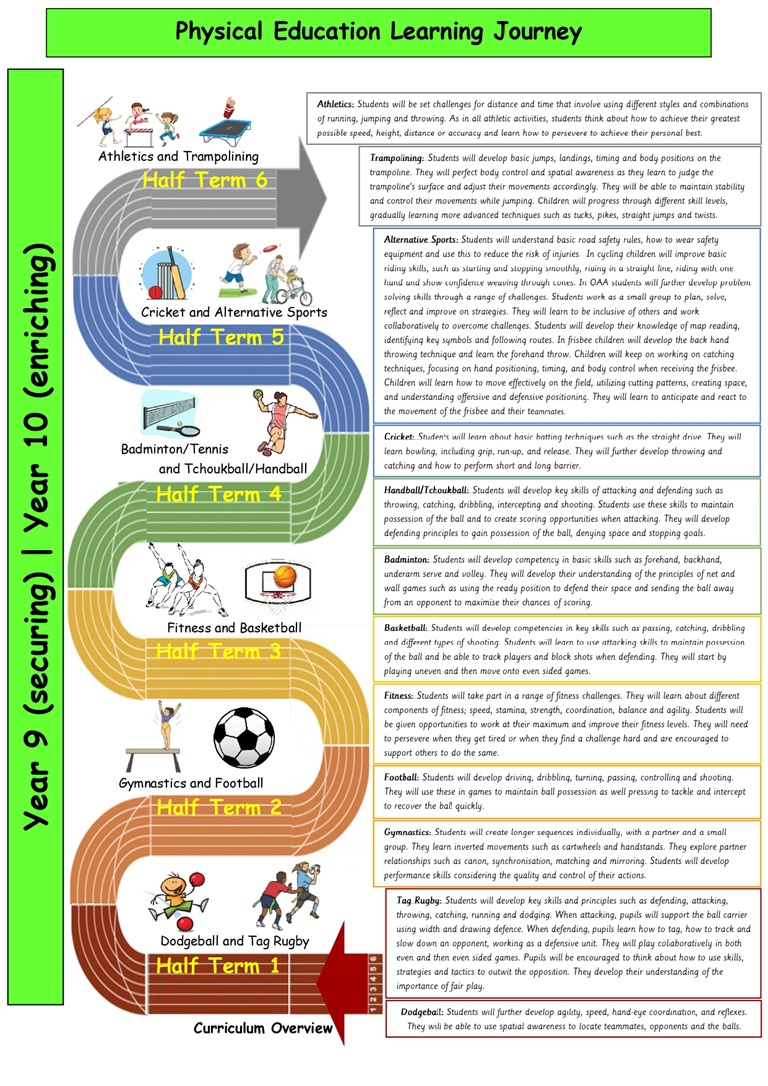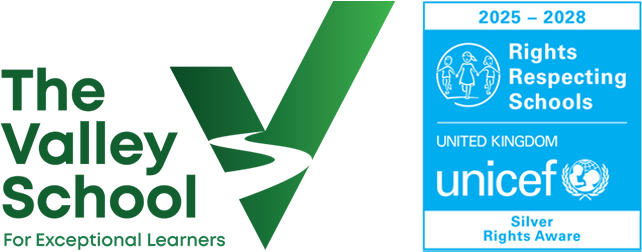PE Curriculum Rationale
At The Valley School, our Physical Education curriculum is shaped around the diverse needs of our learners, with tailored support for those with SEMH, neurodiverse profiles, and other individual requirements. Rooted in our ethos of being “different for different,” it offers a broad, balanced, and inclusive experience that adapts to each student while remaining aligned with the National Curriculum and our whole-child approach.
Physical Education at our school is not just about developing physical competence. Every lesson is an opportunity to nurture self-esteem, support emotional regulation, strengthen peer relationships and provide students with the skills to lead healthy and active lives. We believe that through varied, meaningful and supportive physical activity, all students can succeed, regardless of ability, experience or background.
Our curriculum enables students to develop competence across a wide range of sports and activities. It helps them sustain regular physical activity, access competitive and cooperative sport, and make informed decisions about their physical health and wellbeing. Through this approach, we also introduce valuable life skills—including swimming and cycling—which support safety, independence and self-confidence as part of a broader focus on lifelong learning.
Ethos and Values
We are passionate about using PE to develop the whole child—physically, emotionally and socially. Inclusion is central to everything we do. Every student is supported to engage, participate and experience success through adapted, structured and enjoyable activities. From early on, students learn to work in teams, understand the value of sportsmanship, and develop mutual respect with their peers.
Our curriculum builds confidence and emotional resilience by helping students overcome personal challenges. Students learn to accept success and setbacks, take pride in effort, and recognise the progress they make. As they move through the school, they take on increasing responsibility—whether leading warm-ups, supporting younger students or officiating games—which helps them develop leadership, communication and independence.
PE also plays an important role in reinforcing healthy habits. Students are taught about fitness, nutrition and wellbeing, helping them understand how physical activity benefits both the body and the mind. We aim to ensure that students leave our school not only with practical skills but also with a positive attitude toward staying active for life.
Intent
Curriculum Design
Our curriculum is sequenced from Year 7 to Year 11 using a spiral model. Skills are revisited and refined over time, increasing in complexity and depth as students develop physically and emotionally. Activities are carefully chosen to suit our learners’ needs and interests, while also reflecting competition calendars, seasonal changes and local opportunities.
Years 7 (introduction) and 8 (development)
In Years 7 and 8, students build strong foundations across a wide range of physical activities, including team sports, gymnastics, athletics, fitness training and alternative sports. During these early years, students also take part in basic cycling sessions—building coordination, confidence and road safety awareness—and learn core swimming skills through lessons at a local pool. These experiences provide essential preparation for independence and wellbeing outside school.
Years 9 (securing) and 10 (enriching)
As students move into Years 9 and 10, the focus shifts toward skill application, tactical understanding and personal responsibility. Activities are more competitive and require greater teamwork, self-reflection and problem-solving. Students are encouraged to make choices about the sports they pursue, helping them take ownership of their physical development. Swimming and cycling continue to feature where appropriate, helping consolidate confidence and proficiency in these life-enhancing skills.
Year 11 (enhancing)
By Year 11, students consolidate the knowledge, skills and confidence they have developed throughout their PE journey. The focus shifts towards greater independence, self-reflection and leadership, with students taking more ownership of their learning and applying their skills in meaningful, real-world contexts.
Students engage in more advanced tactical play across a range of team sports, demonstrating improved game awareness, decision-making and positional understanding. They participate in small-sided and full-court competitive games where they are encouraged to take on captaincy roles, officiate matches, and provide peer coaching. This helps reinforce their communication, teamwork and ability to manage responsibility under pressure.
In individual disciplines such as athletics and trampolining, students refine their technique and are supported to set personal performance goals. They record and analyse their progress, learning how to make targeted improvements through practice and feedback.
Implementation
Teaching and Support
PE at The Valley School is taught by experienced and qualified specialists who understand how to motivate and support students with a wide range of social, emotional, and learning needs. Lessons are structured to ensure all students can access activities with confidence, using consistent routines and clear expectations. Learning Partners provide additional support, and individual adaptations are made where necessary to help every student succeed.
Our three-tiered approach to support includes high-quality inclusive teaching for all, targeted interventions for those who need additional help, and specialist adaptations for individual students requiring more intensive provision. This ensures that every student, regardless of need or ability, can participate meaningfully and make progress.
Assessment, Progress and Outcomes
Student progress is tracked through a personalised, skills-based assessment model that recognises and supports individual starting points, learning needs and rates of progression. Each learner is assessed against a clear progression framework aligned with the physical, social, emotional and cognitive development stages across Key Stages 3 and 4.
Teachers use a range of evidence to build a holistic picture of each student’s development. This includes practical observation, video recordings, performance checklists, self and peer assessment, and reflective conversations. Our bespoke Flight Path system allows us to monitor student growth over time by mapping progress within and across activities (e.g., football, trampolining, fitness, and alternative sports such as cycling or OAA).
Progress is assessed not only in physical performance, but also in areas such as tactical understanding, emotional resilience, leadership, communication, and the ability to reflect and improve. For example, a student developing in football may progress from learning simple ball control and game rules in Year 7 to anticipating opposition tactics, giving peer feedback and adjusting their play in competitive situations by Year 11.
Assessment criteria are tailored by activity and year group—ensuring that each student, regardless of ability, can achieve success and track meaningful development. These criteria support teachers in setting next-step targets, designing inclusive lessons, and celebrating individual achievements in line with each student’s pathway.
Enrichment and Extra-Curricular Opportunities
Our PE offer extends well beyond the classroom. Every break and lunchtime, students have access to our on-site fitness suite, where they can take ownership of their personal health and wellbeing in a supervised setting. In addition, we run a structured lunchtime sports programme in the school sports hall, offering a different activity each day—these include dodgeball, cricket, badminton, basketball, trampolining and more. This variety keeps students engaged, active and motivated to participate regularly.
Once a week, house competitions take place in the MUGA, where students compete in mixed teams across a range of team games. These events promote friendly competition, teamwork and school spirit, while also developing leadership and decision-making skills.
Students also have the opportunity to represent the school in a wide range of inter-school sports competitions throughout the academic year. These fixtures play an important role in building teamwork, confidence and pride, and offer students meaningful experiences outside the classroom in structured, supportive environments.
Our inter-school calendar includes regular competitive opportunities across football, basketball, dodgeball, netball, boccia, cross country, and athletics. Students from all year groups take part, with both junior (Years 7–9) and senior (Years 9–11) teams competing at home and away venues, including events hosted at The Valley and partner schools.
We also run girls-only fixtures in football, basketball and dodgeball to ensure inclusive participation and increase confidence and enjoyment for female students. These dedicated events are highly valued by students and have helped raise engagement across the curriculum.
Each fixture provides not just the chance to compete, but also to practise communication, resilience and sportsmanship under pressure—skills that are transferable to wider school life and beyond. Whether a student is stepping onto the pitch for the first time or representing the school in multiple events, we value their effort, attitude and growth.
Impact
Participation in physical activity is high, with many students regularly accessing our lunchtime and after-school enrichment offer. The daily use of our fitness suite, alongside structured lunchtime sport and house competitions, ensures that students are engaging in purposeful movement throughout the school week—contributing positively to their physical and emotional wellbeing. Physical literacy improves year-on-year, with students showing measurable progress in coordination, agility, strength and control across multiple sports. Internal flight path data reflects consistent development in both physical and interpersonal domains, with clear evidence that students are not only learning how to move but also how to collaborate, lead, and reflect.
Qualifications and Leadership Awards
By the end of Key Stage 4, many students leave The Valley School having gained valuable leadership experience and formal recognition of their achievements in Physical Education.
In Year 10, selected students complete the Young Leader in Sport Award, a nationally recognised programme delivered in partnership with the Leadership Skills Foundation. This award introduces the principles of sports leadership and provides learners with practical opportunities to plan, organise and assist with physical activities. In doing so, students develop essential life skills—such as confidence, responsibility, teamwork and communication—that extend well beyond the sports hall.
Those who choose the qualification pathway in Key Stage 4 have the opportunity to achieve the BTEC Level 1 Introductory Award or Certificate in Sport, by completing two coursework-based units tailored to our learners’ strengths and interests.
- The Assisting in a Sports Activity unit helps students develop coaching and leadership skills, teaching them how to plan and deliver safe, inclusive sessions. They gain experience supporting peers and managing small group activities with growing confidence.
- The Playing Sport unit enables students to improve their sporting technique, apply tactics in game situations, and evaluate their performance using structured reflection and feedback.
Together, these achievements provide students with nationally recognised qualifications that reflect both their physical progress and personal development. They leave with increased confidence, a sense of accomplishment, and improved readiness for further education, training or employment in active, people-focused environments.
Celebrating Achievement
We value and celebrate all forms of progress—whether it’s trying a new activity, improving fitness, showing teamwork, or leading a peer. Success is recognised in lessons, in assemblies, and through school-wide celebrations that promote a sense of pride and belonging.
Physical Education at The Valley School is more than just sport. It is a powerful platform for developing resilience, communication, leadership, health awareness and self-belief. Through a carefully planned and inclusive curriculum, every student has the chance to succeed—physically, emotionally and socially—while developing the confidence and independence they need for life beyond school.








